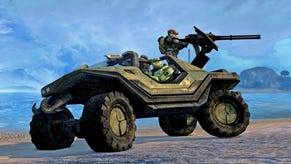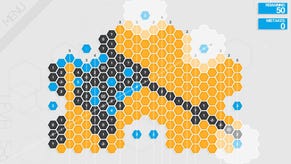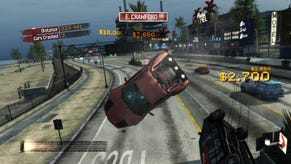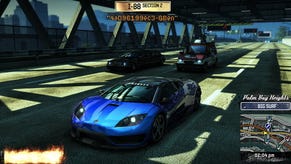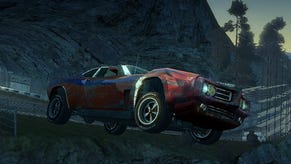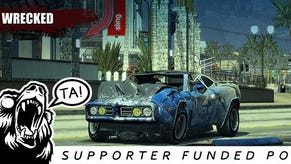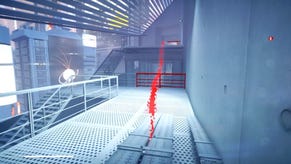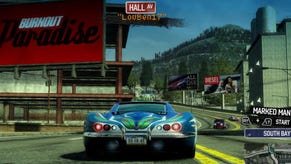Wot I Think: Burnout Paradise
Burnout Paradise was released last week on PC, via a gigantic time-limited demo. It was one of the most popular console games of last year, thanks to its open-world racing model. But is it any good? Here's Wot I Think.
Playing Burnout Paradise on PC was rather like biting into a large, delicious sandwich, filled with quality meats and condiments. Sadly the first bite revealed that the sandwich also contained an elastic band. Once the inedible foreign article had been spat out, and cuss words uttered, the meal was delicious. After all, this is one of my favourite sandwiches. And I am so very, very hungry.
Yes, those sign up problems were ludicrous. A form that requires you to click and press enter? What? No option to recover previous sign up? Unskippable intro? Broken servers? Yes, it's embarrassing for them and frustrating for us, but I'm over that now. I'm going to be kind to the rest of the game, because it deserves a manly punch on the shoulder and a big smile.
The distribution of the entire game as a demo might have strained our info-pipes, but it was a brave, intelligent move. How else can you demo an open-world game? And if the pirated version is going to be out there in a snap of your fingers, no matter what dance the publishers might perform, why not put your legitimate buy-me-in-a-moment demo out there too? Isn't this the kind of move that all publishers should now be looking at? Putting aside the fact that the demo was clearly too short, isn't this one of the best ways to distribute, advertise, and sell a game on PC? (No sign of it on Steam yet, which seems like a major oversight.) I'd almost buy Burnout Paradise on principle.
Anyway, before we get the gold-valved heart of Burnout Paradise - a smart, fun, progressive racing game - I'm going to meander a bit.
Racing games are essential to my gaming library. They're one of the things that videogames do best: that sense of speed, and potential impact - it's something I fell in love with on the earliest computers, and never let go of. And yet it's so very easy to fuck up. I think it's something to do with the tactile nature of the controls, the continuous feedback loop of input and output. If the balance is even slightly out, then the whole thing is a waste of time. You see it all the time.
But these days I feel as if I'm learning to love racing games again. The root of this was when the love affair went sour. It was with Grand Prix Legends, a PC racing game of unflinching realism and startling depth. Having played the game for many weeks, I understood that its dedication to realistic racing was a heavy achievement. I get like that sometimes - I did it with Quake 3. I dreamed about the racing line, about holding on for all those laps. I also understood that I hated the game to its core. I went off racing games in an instant. It took a long time to get them back.
Now, now, don't think I'm judging you, Grand Prix Legends Fan. Because you are, in fact, one of my closest friends. I understand your interests. For me, though, games need some give. I take games far too seriously, clearly, and I can't do that with racing games too. I want Midtown Madness. I want to drive round the track backwards in Indy 500. I want to fly off a bridge at 150mph, and be laughing.
Racing needs to have some kind of bungee effect, where I'm always able to claw things back. I don't want realism. I want the illusion of just-about-gripping-tarmac, not the reality. I want to crash horribly, with all the spinning glass and shards of metal that entails, and be instantly back in the race. Having been burned in the past, and drowning my sorrows in the sci-fi speed-porn fantasies of Wipeout games and their hover-rocket pretenders, I am now re-learning my love for wheel and lap-time racing games. Particularly the ones that do not care too much. Last year was particularly rewarding. GRID was entertaining. Burnout Paradise was better.
Criterion's bold open-world racing game isn't the prettiest trinket, nor is it quite as ferociously compelling as earlier Burnout games. Nevertheless it feels astonishingly responsive, and rewardingly solid. The design is all about functionality of fun. It wants to sell you two things: a sense of speed, and the believability of its collisions. And it does that.
The functional nature that extends to everything in it: this is the fifth (?) time an open world racing game has been attempted, and pulled off (first being this), thanks to the simplicity of its challenges. Roll up to an intersection, spin wheels at the traffic lights, and you can be thrown straight into a race. When the race is done, you're still on the same street, rolling to your next goal. It feels organic, zipping about, always rolling into the next challenge. The open world feels integral to the experience, and it changes the tone of racing, just Stalker's open world changed the tone of shooting. If nothing else, it points the way for other open world pure-racers, such as FUEL, and suggests they might have a future. (This game is nothing, nothing, like GTA.)
It's superbly brutal too. The road rage events, where you simply have to destroy your opponents, give new meaning to the term "muscle car." In fact, cars aren't simply rewards in Burnout, they're trophies, in the hunting sense: you collect cars by forcing them off the road and wrecking them.
There's no hidden agenda here, just caricatured automotive ultra-violence. Some folks have suggest that the lack of a circuit-based, here-to-there kind of racing model means the game doesn't pull you in, but I reject that. As soon as you've found the beat of doing event after event, you have no problem with forward momentum. Collecting cars, beating the various events - which include staying on the road as other cars try to take you down, mad stunt routes, waypoint-driven tours around the cityscape, as well as straightforward races - it's a well-punctuated progression, allowing little sideshows of car-swapping housekeeping and exploration between the events. Hurtling off the given route and still thundering your way into the lead makes for brilliant racing, particularly when the last few moments of a race are a wheel-grinding chariot-race to the line.
The bikes - added to the game after its initial console outing - are a new game mode in themselves, focusing more of sheer speed. The bike events are far less numerous, but they feel minimal, brutal There are fewer cars on the road. You move faster, even without the Burnout boost. Far more than with the cars, you are dragged into the notion of open street racing. Enter first-person view on the bikes and you taste what is possibly the best sense of high speed racing in any game. It's breakneck stuff, even if your rider is never actually visible to break a neck in those brutal crashes.
All this is facilitated by the city itself - a sprawling, explorable space. It's one of those games where you can really see how game and architecture work together. Just as shooter maps are spaces designed for gun battles, so this is a city designed for high speed absurdity. Those moments when you assume you've lost yourself to a deadly crash, and you find yourself bursting through a barricade, across a chasm and onto another road - in what is actually a short cut - make you hoot with joy. Criterion have clearly put the time and effort into testing their city - carving out the secret routes and off-street pathways that make the game such a mad joy. They've not tried to bend the game to their level design, quite the opposite: the pedestrian-free avenues of Paradise City are a guiltless exercise in creating an environment that scaffolds your fun at every opportunity. They've driven every alleyway, tested every curve and bend, dropped insane, arbitrary ramps and jumps into a city where there is nothing but motorised lunacy.
This becomes even more obvious in the drop-in drop-out multiplayer, when you find previously unseen portions of the city, where you and your chums enter playgrounds of ramps, jumps and death-traps. Obliterating your vehicles over and over is a distinct joy.
Having lost my 360 disc earlier in the year - a pitfall of physical media - this is the first game I've bought for myself this year. It makes sense to me: it Alt-Tab's out perfectly, and I can put on my own music, or stop to correct Kieron's spelling mistakes on RPS. I am using a 360 controller, but it seems to play reasonably well with a keyboard too. This is a decent conversion to PC, but there are some problems. No text chat in multiplayer, for example, and people are also reporting some crash bugs, which will hopefully be patched out. While it runs beautifully on a mid-spec gaming PC, it hasn't really been buffed for the higher end PCs, and could have been a shader-number more beautiful.
I suspect Burnout Paradise will keep some people at arms length with its manic, broadly ludicrous take on racing - not to mention the piss weak rubbish that pads out the soundtrack, the nauseating radio DJ tipster, the sheer macho bullshit of it all. But it's brilliant, and I recommend that, at the very least, you play the demo.







